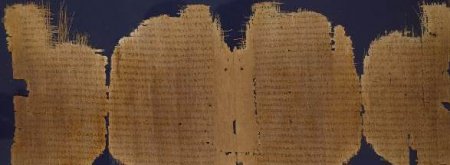Did Key Christian Beliefs Slowly Change Over Time?
Was the New Testament largely composed in the 4th century AD? Did Christian teaching about the divinity of Jesus and his bodily resurrection develop into 'orthodox' doctrine over many years? Dr Peter J. Williams, Warden of Tyndale House, Cambridge, addresses these and other common misconceptions about Christianity in this short talk.
A few notes from the 15 minute talk are given below, along with some notes of the questions asked in the following Q&A session, which lasted about 10 minutes.
The talk concentrates on three key topics:
- The four Gospels in the New Testament.
- Whether the understanding of Jesus as God is a late development.
- Whether we can rely on the claim that Jesus rose from the dead.
1. The Four Gospels in the New Testament
The first complete list of the New Testament books comes from the 4th century. The earliest existing compilation of the complete New Testament is the Codex Sinaiticus – again from the 4th century.
There is evidence of 4 Gospels before Constantine. Held in Dublin, the P45 manuscript gives parts of all 4 Gospels and Acts dating from about 100 years before Constantine (AD 200-250). In Lyons, c. AD 185, the 4 gospels are compared to the 4 winds, confirming the established number. Around the same time, Tatian in Syria produced a harmony of the 4 gospels in a single narrative.
2. Jesus is God
Some brief examples showing that this belief did not develop very late.
Pliny the Younger, Governor of Bithynia, wrote to the Emperor in AD 112 about how to treat Christians. He describes their worship to Christ "as to a god", which shows that even at this time, Christians saw Jesus as God.
Various early Christian documents, dating from 20 to 30 years after the resurrection, talk of various roles of Jesus, for example Judge and Creator, which in Judaism are exclusively applied to God.
3. Jesus Rose from the Dead
In Paul's letter to the Galatians, dating from the late 40s or early 50s, Paul says that God has raised Jesus from the dead. Many of the New Testament documents do not explicitly argue for or state it, but simply presuppose it.
Writing in the mid-50s, in his first letter to the Corinthians (1 Corinthians 15), Paul reminds his readers what he had previously taught them - "what I received I passed on to you" (verse 3). What he had received, many years earlier, was "that Christ died for our sins according to the Scriptures, that he was buried and that he was raised on the third day according to the Scriptures".
Questions and Answers
Questions raised afterwards, with a brief summary of the response shown in square brackets:
What is signified by the fact that Jesus is called "Lord"? [It can have various meanings but some of its uses in the New Testament of Jesus include the sense of Jesus being God.]
How were the New Testament books chosen and why were some left out? [The credentials of the 4 gospels set them apart.]
How different were the beliefs of Paul from the other disciples? [For 200 years or so the idea has been proposed that there was a major difference of opinion between Paul and the first disciples, but the New Testament shows no difference of opinion on the view of Jesus being God.]
Is the end of Mark's Gospel a problem? [The last 12 verses (Mark 16:9-20) are not in the earliest and most reliable manuscripts. But this does show there was no Christian conspiracy to make all the documents agree.]
© 2014 Cambridge Inter-Collegiate Christian Union (CICCU) and Peter J. Williams



